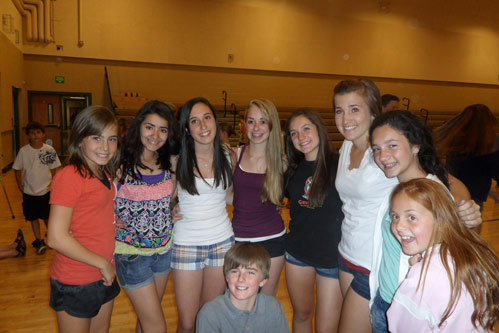basque heritage worldwide

10/18/2010

ADVERTISING
Vanessa Manjarrez/Chino, California, USA. For the past few years I have not only looked forward to summer vacation but also to going to Udaleku. Udaleku is a Basque culture summer camp for Basque kids and teens between the ages of 10 and 15.
Every summer one Basque community kindly hosts this camp. At this two-week camp, Basque youths have the opportunity to learn about Basque traditions and their heritage. We study, Euskara, our complicated language and practice speaking between classes.
We are taught how to read notes and play Basque music on a traditional Basque flute, or Txistu. We also learn and/or become better at playing the traditional Basque card game, Mus, and practice many traditional dances from different regions of the Basque country.
This year Udaleku 2010 was held in Reno, Nevada from June 21 to July 2. There were approximately eighty children and teens, including seven from the Basque Country. We studied the province of Bizkaia and its capital city, Bilbo.
All of the instructors at Udaleku are very knowledgeable and dedicated to making learning about our Basque culture and traditions fun and exciting.
Some of the activities which I particularly enjoyed were the crafts such as making the 'eguzkilore' or sunflower. It is traditionally placed on the front door of Basque houses for protection against the evil spirits that come during San Juan.
Learning to sing 'Gernikako Arbola' was certainly special because it is our Basque national anthem. As a memorable keepsake we decorated bookmarks using pressed leaves from the Gernika tree and wrote the lyrics of our anthem on them. I also loved learning many amazing Basque dances including 'Mahai Gainekoa' in which we danced on top of a table.
Besides learning in the classrooms, fieldtrips were also part of our Udaleku experience. In keeping with the San Juan tradition, we serenaded Basque families in their homes. Then built a campfire on a ranch and broke out in traditional Basque songs accompanied by the accordion and pandero.
On another day, we traveled to the Little Antelope Pack Station in Coleville, California and camped there overnight. At this campsite in the mountains, we discovered interesting tree carvings carved by the Basque sheepherders from more than 100 years ago.
On the very last day of camp, we eagerly put on a final performance to share all that we had learned with our families and friends.
In addition to studying about Basque culture and traditions, there is another part of the Udaleku experience which is priceless. This is truly a wonderful bonding experience for everyone.
We all came from various parts of the country and some from Europe, but during these two weeks we had the opportunity to hang out with each other and have fun.
Getting to know the European participants, who are so funny and nice, was especially great because we could share our culture with them and they provided us with insights of theirs.
I have been going to camp for four years now and have made many good friends. These are amazing friends that I will always have, even if I only see them once a year, because we all have our Basque roots in common as well as an appreciation for the uniqueness of our culture.
Whether we are 100%, 50%, 25%, or less Basque, we are all Basque and love being Basque.
Participating in Udaleku is definitely a one-of-a-kind experience that most likely only people of Basque heritage can understand. Once you have taken part in Udaleku, you will always look forward to participating again.
The worst part of Udaleku is saying good-bye on the last day of camp.
It is typically a very emotional time. Many tear up and some cry at the thought of leaving good friends and saying, "ikus arte".
Fortunately, however, not only do we have great memories of camp but we can also keep in touch with each other through facebook, email, and texting until we meet again at next year's Udaleku.
ADVERTISING
ADVERTISING
ADVERTISING
ADVERTISING
ADVERTISING
© 2014 - 2019 Basque Heritage Elkartea
Bera Bera 73
20009 Donostia / San Sebastián
Tel: (+34) 943 316170
Email: info@euskalkultura.eus